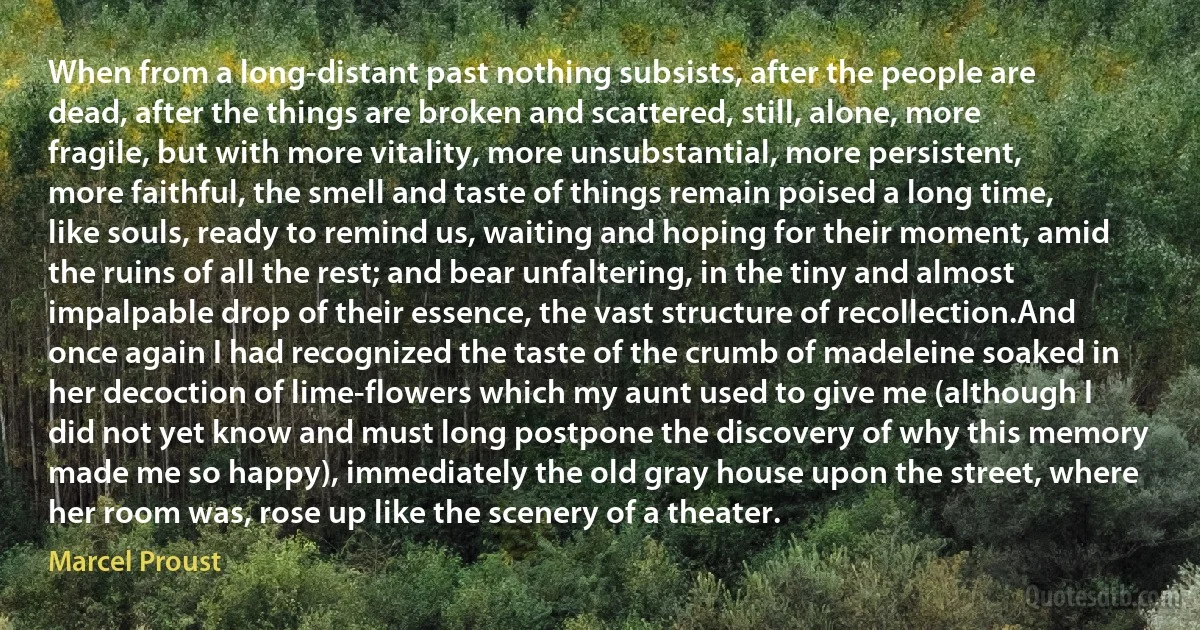
When from a long-distant past nothing subsists, after the people are dead, after the things are broken and scattered, still, alone, more fragile, but with more vitality, more unsubstantial, more persistent, more faithful, the smell and taste of things remain poised a long time, like souls, ready to remind us, waiting and hoping for their moment, amid the ruins of all the rest; and bear unfaltering, in the tiny and almost impalpable drop of their essence, the vast structure of recollection.And once again I had recognized the taste of the crumb of madeleine soaked in her decoction of lime-flowers which my aunt used to give me (although I did not yet know and must long postpone the discovery of why this memory made me so happy), immediately the old gray house upon the street, where her room was, rose up like the scenery of a theater.
Marcel ProustRelated topics
almost aunt bear dead drop faithful happy house memory moment nothing once past people ready recollection remain rest rose room scenery smell street taste time vast vitality waiting yet things madeleineRelated quotes
Going into the House last night, the caution lately given me by a poor but honest Scotchman struck me. He said to me, "Mr. Bright, I'll give you a piece of advice. You are going into bad company; and now that you are in, remember that you stick to what you said when you were out." If one had dropped from the clouds upon the floor of the House and listened to the debate last night, I never should have dreamed that there was the least distress or discontent in the country. It was true that Lord John Russell made a very clever speech and some hard hits at the ministry...Then came Lord Palmerston, and he made a very clever speech, if there was no country; it would have been very well at a debating club; it had some hard cuts at the ministry, interspersed with references to Afghanistan and the Ameers of Scinde, and everything but the condition of England question.

John Bright
In the history of madness, two events signal this change with singular clarity: in 1657, the founding of the Hôpital Général, and the Great Confinement of the poor; and in 1794, the liberation of the mad in chains at Bicêtre. Between these two singular and symmetrical events, something happened, whose ambiguity has perplexed historians of medicine: blind repression in an absolutist regime, according to some, and, according to others, the progressive discovery, by science and philanthropy, of madness in its positive truth. In fact, beneath these reversible meanings, a structure was taking shape, which did not undo that ambiguity but was decisive for it. This structure explains the passage from the medieval and humanist experience of madness to the experience that is our own, which confines madness in mental illness.

Michel Foucault
[...] we can strip off all grammatical clues to sentence structure, all affixes and prepositions, and yet still achieve communication. Thus restricted to nouns, simple "stories" can be told in word chains: Woman, street, crowd, traffic, noise, haste, thief, bag, loss, scream, police.... Again, the reader's past experience of his language is sufficient to restore the missing elements, sufficiently accurately for the purpose. But of course, not only does the reader have experience of sentence structure, enabling him to supply the missing syntactical elements, but also he has experience of typical contexts in which the various words are used; many words bear an aura about with them. It might be more difficult to tell a tale about a policeman who robbed a woman, for instance, with so little redundancy!

Colin Cherry
There is a Polish countess here, who likes me much. She has been very handsome, still is, in the style of the full-blown rose. She is a widow, very rich, one of the emancipated women, naturally vivacious, and with talent. This woman envies me; she says, "How happy you are; so free, so serene, so attractive, so self-possessed!" I say not a word, but I do not look on myself as particularly enviable. A little money would have made me much more so; a little money would have enabled me to come here long ago, and find those that belong to me, or at least try my experiments; then my health would never have sunk, nor the best years of my life been wasted in useless friction. Had I money now, - could I only remain, take a faithful servant, and live alone, and still see those I love when it is best, that would suit me. It seems to me, very soon I shall be calmed, and begin to enjoy.

Margaret Fuller
It is better the truth should come little by little. I have learned that, being a priest. Perhaps, in the old days, they ate knowledge too fast.
Nevertheless, we make a beginning. it is not for the metal alone we go to the Dead Places now - there are the books and the writings. They are hard to learn. And the magic tools are broken - but we can look at them and wonder. At least, we make a beginning. And, when I am chief priest we shall go beyond the great river. We shall go to the Place of the Gods - the place newyork - not one man but a company. We shall look for the images of the gods and find the god ASHING and the others - the gods Lincoln and Biltmore and Moses. But they were men who built the city, not gods or demons. They were men. I remember the dead man's face. They were men who were here before us. We must build again.

Stephen Vincent Benét
